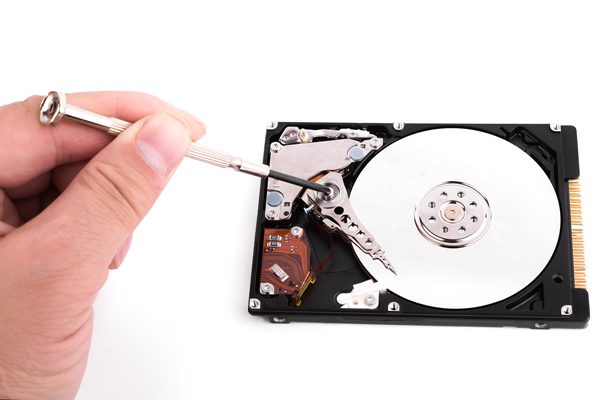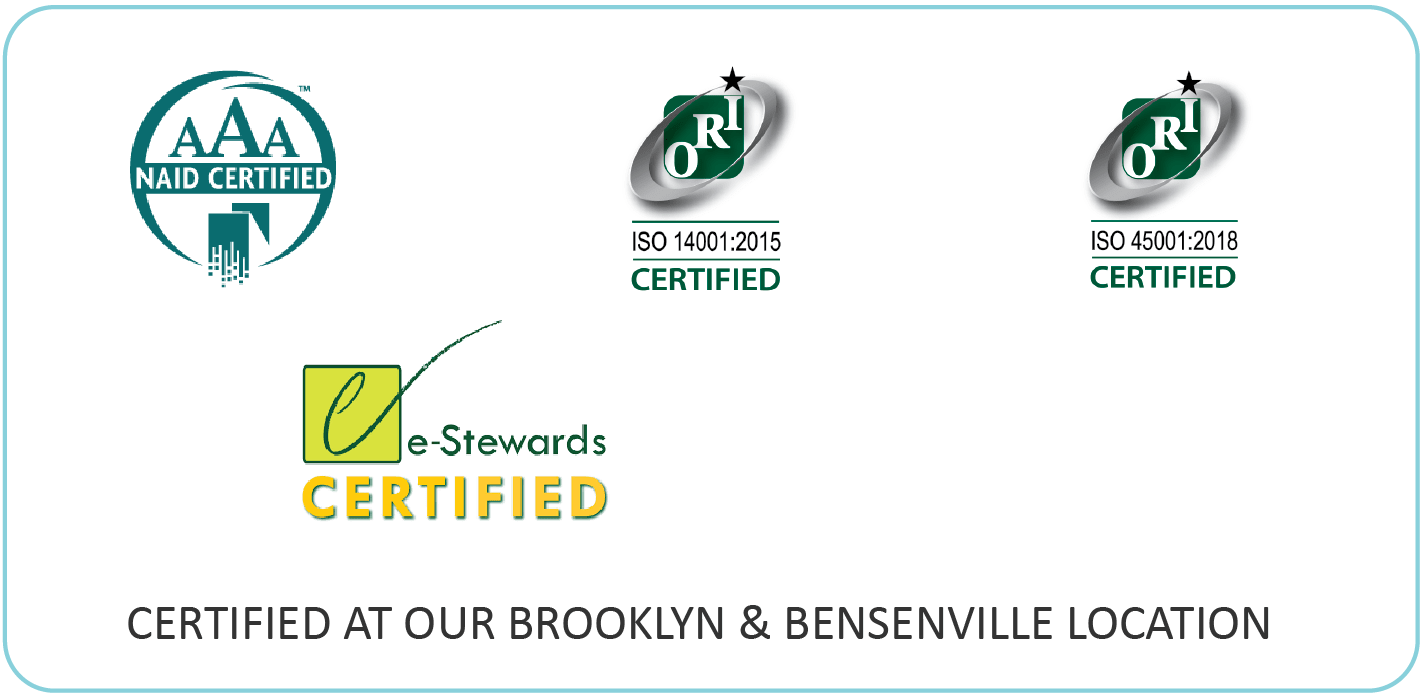How do you destroy data on a hard drive?

If your company uses computers, flash drives, external hard drives, magnetic tape, CDs or DVDs, or any other type of storage media, then you need to have a data destruction policy in place to ensure that the data contained on them is not accessible after the medium’s useful lifespan has passed. With identity theft and related cyber-crimes increasing on a daily basis, it is more important than ever to protect your company, your brand, and your customers by using the most effective data destruction methods available.
Here are the top five ways to destroy hard drive data.
#5 – Formatting / Throwing the Drive Away / Other DIY Methods
If a company does not have a set policy for data destruction the importance of it can often be overlooked. Surprisingly it is still not uncommon for a company to either sell, donate, or simply throw away their old computer equipment without even addressing the data that remains on the hard drives. This could lead to sensitive corporate information becoming public as well as being liable for criminal charges from laws such as HIPPA, GLB and SOX. The average insurance cost per data breach was $3.7 million in 2011, according to a recent study by NetDiligence.
There is unfortunately a lot of misinformation of the web as well as free “wiping” software that can lead companies into thinking their practices are safe while the reality is far from it. Formatting a drive and reinstalling an operating system such as Windows will make it look like your data is gone, but it is still there on the drive. Free software that does not provide reporting cannot prove it has really wiped every sector on the disk and there is no way to know what it actually did. None of these options truly destroy your data which is why Liquid Technology does not recommend any of them.
Pros
- None
Cons
- Does not meet DOD standards
- Could easily lead to your data becoming public
- In some cases against the law
Trying to tackle a project as important as your company’s data security alone is not a smart solution. Your data would be much more secure letting Liquid Technology help you choose from the following other methods.
#4 – Hard Drive Crushing
Hard drive crushing is an inexpensive and effective way for rendering a hard drive unreadable and unusable. While this process does not completely destroy hard drive data, it is useful for companies with less-than-strict security concerns or as a temporary means of eliminating access to the data during the time span between equipment pick up and offsite physical destruction of the drives.
Liquid Technology’s industrial hard drive crushers offer mobile convenience and effective results that can be performed on-site.
Pros
- Mobile solution that can be done anywhere
- Inexpensive option
- Report of all of the drives serial number can be provided
Cons
- While it makes the hard drive inoperable, it does not complete destroy the data.
- For best practice must be used in combination with hard drive shredding
Since it does not destroy all of the data on the drive it is not the best stand alone option, and should be used in conjunction with hard drive shredding for optimal security.
#3 – Hard Drive Degaussing
Hard drive degaussing destroys hard drive data using a powerful magnetic field that renders the recorded data unreadable at the user level. Because the electromagnets used in this process also ruin the servo motors and spindle motor inside of the drive, degaussing should not be used if you have plans of re-using, selling, or donating the accompanying computers.
Liquid Technology utilizes industrial-grade degaussing machines that are approved by the NSA for compliant data destruction.
Pros
- Changes the magnetic alignment of the data, making it unreadable
- Can be done on or off-site
Cons
- Destroys any resale value of the drive
- Not auditable, no easy way of knowing if the degaussing has worked
While in theory this is a good method, the lack of auditable reporting creates too great of a potential risk. Using degaussing in combination with shredding is a more effective method.
#2 – Hard Drive Shredding
Hard drive shredding is the actual physical destruction of the hard drive by a machine that shreds the drive into hundreds of tiny pieces. The drive is fed into the shredder where several rows of gears chew the drive apart, making it impossible for it to be reconstructed.
Liquid Technology’s hard drive shredding services can be performed on-site with our mobile shredder trucks or at our facility. When we destroy hard drive data with our shredders, our services include serial number reporting, video capture, asset tag removal, chain of custody documentation, and environmentally responsible disposal of the e-waste.
Pros
- Meets DOD standards
- Report of serial numbers and DVD of actual shredding is provided
- Can be done on or off-site
Cons
- Physically destroys the drives preventing them from being resold
Many companies require all of their hard drives to be shredded and it is easy to see why. This method meets DOD standards, is fast and efficient, and can done on or off-site. The only downside is that sometimes tens of thousands of dollars in resale value is lost by the drives being destroyed.
#1 – Erasure
When we mention erasure, we are not talking about deleting a file or formatting a hard drive. Both of these processes simply remove the data from your sight; they do not destroy hard drive data completely. Data erasure is performed using specially-designed software that overwrites the existing data on the hard drive multiple times using several different types of data patterns.
The Department of Defense has strict guidelines as to how data erasure should be performed in order for it to be compliant. Liquid Technology’s proprietary data erasure software meets current DOD 5220.22-M standards and provides fully auditable results. In addition, once a drive has been erased it can be resold on the secondary market creating additional value for the client.
Pros
- Auditable report is provided that proves drives were erased
- Allows for drives to be reused, adding value
- Meets DOD standards
- Can be done on or off-site
Cons
- Price – It is not the cheapest solution
- Does not work on inoperable hard drives
This is our most popular solution as it provides the best reporting and well as creates the most value. Generally the extra cost is made up for by the resale value of the drives, however this is not always the most cost effective method for older drives that have little to no value. Inoperable or dead that no longer spin up have to be shredded as the software can only be used on working drives.
Which Data Destruction Method is Right for You?
As you can see there is no perfect method for destroying your data. This is why Liquid Technology offers a wide variety of solutions to custom suit your individual needs. The data destruction method you choose is dictated by the media you need destroyed, the sensitivity of the data, and whether or not you plan on reselling, donating, or re-using the equipment. For instance, if you want optimum data destruction that retains the functionality and value of the hard drive, then erasure will be best for you. Or, if the drives are old and no longer have resale value, then degaussing or shredding them may be more suitable. Often times a combination of two or even three methods are used depending upon these and other factors. Do you have your own preference when it comes to destroying your data? Tell us in the comments below.


